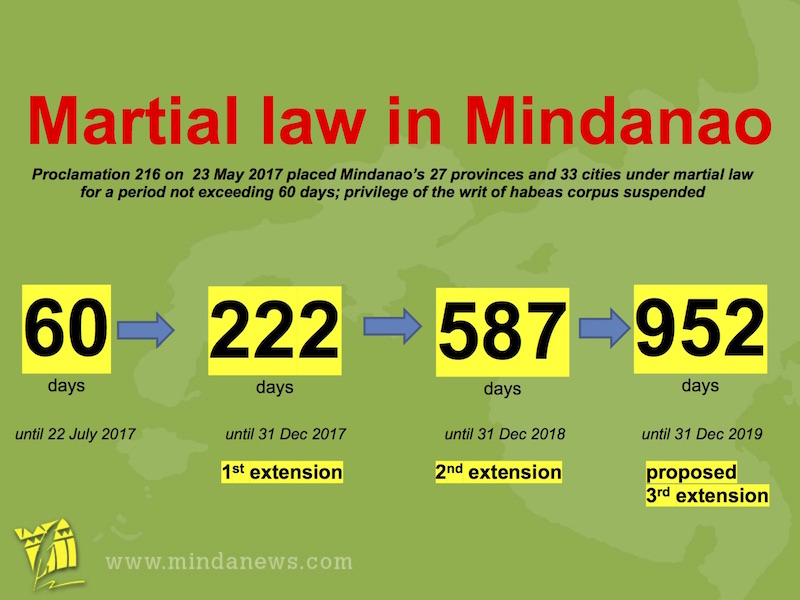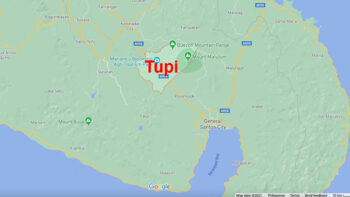DAVAO CITY (MindaNews / 12 December) — As expected, the Joint Session of Congress, voting 235 in favor, 28 against and one abstention, approved President Rodrigo Duterte’s request for a “further extension” of martial law and suspension of the privilege of the writ of habeas corpus until yearend 2019, even as Senator Francis Escudero asked the body if they had authority to extend martial law beyond the end of their terms on June 30, 2019.
Of 18 senators present, 12 voted for extension, five against and one abstained. representatives present, 226 voted ‘yes,’ and 23 voted ‘no’ to extending martial law for the third time.
The extension until yearend 2019 brings to 31 months or 952 days the duration of martial law over Mindanao’s 27 provinces and 33 cities since Proclamation 216 was issued on May 23, 2017, Day 1 of the Marawi Siege.
From 60, it was extended to 222 days until yearend 2017, to 587 unntil yearend 2018 and to 952 until yearend 2019.
 In his December 6, 2018 letter to the Senate President and House Speaker, Duterte cited the joint security assessment report submitted by Armed Forces Chief of Staff Gen. Carlito Galvez and Philippine National Police Chief Oscar Albayalde which listed accomplishments under martial law: reduction of the capabilities of different terrorist groups through neutralization of 685 members of local terrorist groups (LTGs) and 1,073 members of the communist terrorist groups (CTGs); dismantling of seven guerilla fronts and weakening of 19 others; surrender of unprecedented number of loose firearms — more than 8,000 from January to November 2018; 19% reduction of atrocities committed by CTG in 2018 compared with 2017; 29% reduction of terrorist acts committed by LTG in 2018 compared with 2017; and substantial decrease in crime incidence, noting a 51% reduction in Cotabato City and 38% in Maguindanao.
In his December 6, 2018 letter to the Senate President and House Speaker, Duterte cited the joint security assessment report submitted by Armed Forces Chief of Staff Gen. Carlito Galvez and Philippine National Police Chief Oscar Albayalde which listed accomplishments under martial law: reduction of the capabilities of different terrorist groups through neutralization of 685 members of local terrorist groups (LTGs) and 1,073 members of the communist terrorist groups (CTGs); dismantling of seven guerilla fronts and weakening of 19 others; surrender of unprecedented number of loose firearms — more than 8,000 from January to November 2018; 19% reduction of atrocities committed by CTG in 2018 compared with 2017; 29% reduction of terrorist acts committed by LTG in 2018 compared with 2017; and substantial decrease in crime incidence, noting a 51% reduction in Cotabato City and 38% in Maguindanao.
These gains in security and peace and order, according to the report, have led to “remarkable economic gains in Mindanao” but notwithstanding these, “the security assessment submitted by the AFP and PNP highlights certain essential facts which indicate that rebellion still persists in Mindanao and that public safety requires the continuation of Martial Law in the whole of Mindanao.”
Executive Secretary Salvador Medialdea said the public should not fall into the trap that there is no ongoing rebellion in Mindanao. He claimed martial law is “implemented in a very disciplined way, free of abuses” and upholds the rule of law.
What grounds?
Those who opposed the extension from both houses repeatedly asked for the basis of extending martial law, with Senate Minority Leader Franklin Drilon saying that there is nothing in the four grounds cited “that shows actual uprising, actual rebellion.”
Drilon recalled that martial law was “premised on the siege of Marawi.”
President Duterte declared Marawi “liberated from the terrorist influence” on October 17, 2017 and Defense Secretary Delfin Lorezana terminated all combat operations a week later, on October 23.
He quoted Lorenzana as saying during the executive session Tuesday that the continued extension of martial law is a “psy war.”
“Martial law is the highest form of preservation. It cannot be the norm,” Drilon said.
Albay Rep. Edcel Lagman, who was among those who questioned Proclamation 216 and its extensions before the Supreme Court, declared that the Proclamation “has become functus officio and cannot be anymore legally or constitutionally extended,” citing the liberation of Marawi.
“This undue prolongation of martial law in Mindanao would amount to perpetuity considering the length of time this declaration and extension has been made,” Lagman said, adding it is an admission that “military and police authorities failed to achieve the purported objectives of martial law.”
Public clamor
Justice Secretary Menardo Guevarra reiterated what he said in last year’s Joint Session that the Constitution provides a maximum of 60 days for the original declaration but added that “the term of effectivity of martial law actually depends on Congress.”
Lagman asked: “is public clamor a ground for extension,” to which Lorenzana replied: “It is not per Constitution, Mr. Congressman but we listen to our people.”
Local Governments Secretary Eduardo Ano said “if you are a good citizen, you don’t feel martial law at all. If you are a lawless element, you feel restricted.”
 Senator Risa Hontiveros said then President Ferdinand Marcos used his broad powers under martial law to restrain the campaign of his political opponents in the 1978 elections for the Interim Batasang Pambansa. What is the guarantee the Duterte administration would not do the same, she asked.
Senator Risa Hontiveros said then President Ferdinand Marcos used his broad powers under martial law to restrain the campaign of his political opponents in the 1978 elections for the Interim Batasang Pambansa. What is the guarantee the Duterte administration would not do the same, she asked.
Medialdea did not answer the question. He instead responded that it would be good to study the differences between the Marcos martial law and martial law under Duterte, emphasizing there’s a “whale of difference.”
Lanao del Norte Rep. Mohamad Khalid Dimaporo praised the military for accomplishing what the police had difficulty to do: get the loose firearms. “We have inched Mindanao closer to a gun-free Mindanao,” he said.
He also lauded the suspension of the privilege of the writ of habeas corpus paved the way for “143 terrorists abducted because of this advantage,” that last year, there were “80 abducted terrorists” because of it but “unfortunately there are still 180 confirmed at large.”
Dimaporo asked about the possibility that the 180 are not in Mindanao. “What if they are hiding in Cebu City in the Visayas or Metro Manila in Luzon,” Dimaporo asked in Filipino.
He cautioned the public from thinking peace would descend on Mindanao when the plebiscite on the Bangsamoro law is ratified. He cited the thousands of firearms still in the hands of the Moro Islamic Liberation Front that have yet to be decommissioned.
Credit yourselves, not martial law
Senator Escudero, one of five senators who voted no to extension, asked if, indeed, the economy and peace and order improved.
But Escudero said these are not grounds for extension of martial law.
The improvements cited, he said, can be done by the administration even without martial law.
“This cannot be the new normal for Mindanao,” Escudero said, adding Mindanao achieved an unprecedented growth and it can do so “even without martial law.”
He said these were “achieved under the administration, not under martial law” and pointed to the right allocation of resources.
The election of Duterte, the first Mindanawon President, has benefited Mindanao as more resources have been poured into the country’s second largest but previously neglected island.
Escudero also noted that the military and police are committed in fighting terrorism, and that is not because of martial law.
“Nakamit ninyo ito, meron man or walang martial law” (you achieved this with or without martial law), he said, reiterating that they should “give credit where credit is due.”
“Give it to yourselves, not merely to martial law,” Escudero said.
Escudero left his colleagues a “palaisipan” (puzzle) for him: can they vote on an extension of martial law in Mindanao even beyond their terms of office end on June 30, 2019? “Legal ba? … Pwede ba tayong magbotohan?” (Is it legal? Can we vote?),” he asked.
He added it might be best to leave to the next Congress when they assume their post on June 30, 2019, to determine if they should extend martial law beyond that date. (Carolyn O. Arguillas / MindaNews)
